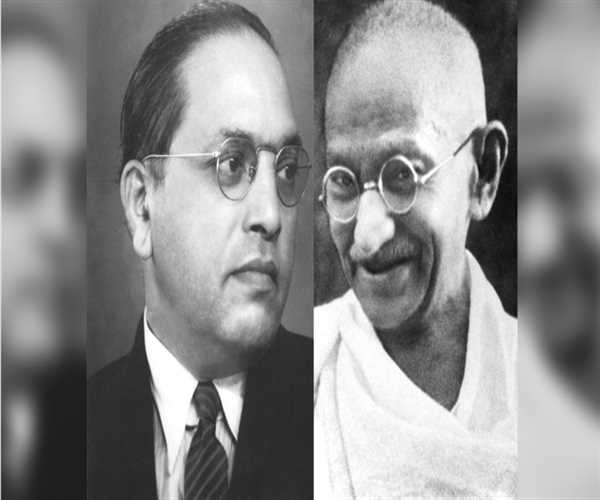
30-Jun-2022 , Updated on 6/30/2022 11:30:55 AM
Why B.R. Ambedkar said Gandhi is 'Never a Mahatma': A Look at Ambedkar's Gandhi
Mohandas Karamchand Gandhi and B.R. Ambedkar are two leaders who played such a huge and significant role. They are such deep-rooted leaders of the Indian Freedom struggle story that their names still flourish even after decades of them being gone. Gandhi and Ambedkar were two building blocks in the making of India's image across the world. Even after Gandhi's death, a lot of questions are in the air about whether Gandhi was worth glorifying and was he really worth the title of 'Mahatma.'
In a 1955 BBC interview, Ambedkar spoke, 'Gandhi was never a Mahatma' I refuse to call him a Mahatma.' In addition to this, in an audio file that was released of an Interview of Ambedkar, he is heard talking about how he felt that Gandhi was not a reformer. He also said, 'He was just an episode in the history of India, not an epoch maker,' The Gandhians would not be convinced when I say that this criticism is not jealousy or hatred for a political opponent. Still, it's an opinion based on clear logic and philosophical differences. Gandhian philosophy did not please Ambedkar for many reasons, and he believed that it was a dangerous doctrine.
Initially, Gandhi's view of an ideal society was the establishment of a perfect caste system till 1922. Then, however, he openly encouraged and advocated its continuance, believing it had great value. According to him, Caste made the Hindu Society durable and held the seed of Swaraj; as it structured a unique power of organization by providing them with the basic means including the following primary education, a defense force; means of self-restraint; as the natural order of society; and the most significant, as the everlasting principle of hereditary occupation for maintaining societal order. Gandhi then declared, 'These being my views, I am opposed to all those who are out to destroy the caste system.' After that, he switched his term from that Caste to varna.
Later in 1925, He said that the Varna system prevalent in old India was divided into four vertically hierarchical orders that are Brahmins, Kshatriyas, Vaishyas, and Shudras, whose socially legislated jobs were learning, warfare, trading, and service to the above three varnas respectively. Ambedkar wrote more than 1800 words where he talked in-depth about why he felt Gandhi was not mahatma. The article starts with Ambedkar describing how annoying the question of whether Gandhi is a Mahatma is. He gave two reasons why he hated all the mahatmas: they take advantage of the blind faith and innocence of the people's faith and eliminate logic and intelligence from the equation. Secondly, he had no clue what mahatma was. According to him, it was easy for anybody to become mahatma by simply changing clothes, leading an ordinary life, and showing some unusual trends and abnormalities in his character. People are blinded by stress, and faith and religion are blind man's sticks who are easily fooled and betrayed by these.
Consequently, according to Ambedkar, Gandhi being a Mahatma, was not at all surprising. Hinting toward the uneducated citizens of India, he predicted that 'Had these things been practiced in any other civilized country, people would have laughed at him.'
Dr. Ambedkar added a fascinating argument that Gandhi was not worthy of the glorification and attention he received since he did not add anything new that Gandhi had added to the maxim and just spread the teachings of Buddha on 'Satya' and 'Ahimsa.' In addition, he said that Gandhi did not tell the world the circumstances and extent to which these teachings uphold. He believed that if a man has capacity and character, he can face the realities of life boldly, and it was Gandhi's shrewdness that has managed to keep him on the front line. Ambedkar states, 'Treachery and deceit are the weapons of the weak. Gandhi has always used these weapons.' The powerful way of presenting his thoughts publicly reflects Ambedkar's bold character. He fails to understand that distressed people are easily gullible and are easily manipulated by others; people are emotionally weak; they even unintentionally turn towards people who offer them support and the easy way out of the situation, the one way that, according to them, keeps them safe and secure.
To support what he said, he took a stance from the real life, how Gandhi made empty promises during the round table conference by telling the depressed classes that he would not raise any objections to their demands and did the exact opposite as soon as the depressed classes presented their 14 demands and in turn opposed the demands placed by the representatives of the Depressed Classes. He exposed Gandhi's hypocritical nature, which was unconcealable in many instances in his lifetime.
Furthermore, he added another anecdote of how Gandhi, during an open session of Congress to humiliate Nehru, opposed the proposals made to amend the Nehru Committee's Report. He expressed discontent by quoting, 'The corrections which were proposed to be made in the Nehru Committee Report were suggested by Mr. Jinnah for the benefit of his community. But, when Gandhi came to know about it, he thought a great deal more had been given to the Moslems by Pandit Motilal Nehru than what he wanted. In order to humiliate Pt. Motilal Nehru vehemently opposed these proposals.'
We all know how the excuse of uniting the Hindu Muslim community has played out where the result was the death of people from either community and riots with everlasting destruction. Gandhi was one of the leaders to blame for using this excuse for various reasons and never really taking a stand for his Hindu community nor bridging the relationship. Ambedkar noticed this and stated clearly that 'Hindu-Moslem hostility is the result of deceitful action on the part of Gandhiji. This immensely pained me. There is an old saying which benefits the occasion (Bagal mein chhurri Munh mein Ram): 'God's name on the lips and dagger under the armpit.' If such a person can be called a Mahatma, by all means, call Gandhi a Mahatma.'

Student
I look for a mix of short-term projects and long-term goals. My organizational skills allow me to successfully multitask and complete both kinds of projects. Working for you would give me the opportunity to build upon my experience and skills in data handling , content writing, financial researcher and analyst, and Product manager as part of a really inspiring and rewarding environment to work.
Comments
Join Our Newsletter
Subscribe to our newsletter to receive emails about new views posts, releases and updates.
Copyright 2010 - 2026 MindStick Software Pvt. Ltd. All Rights Reserved Privacy Policy | Terms & Conditions | Cookie Policy